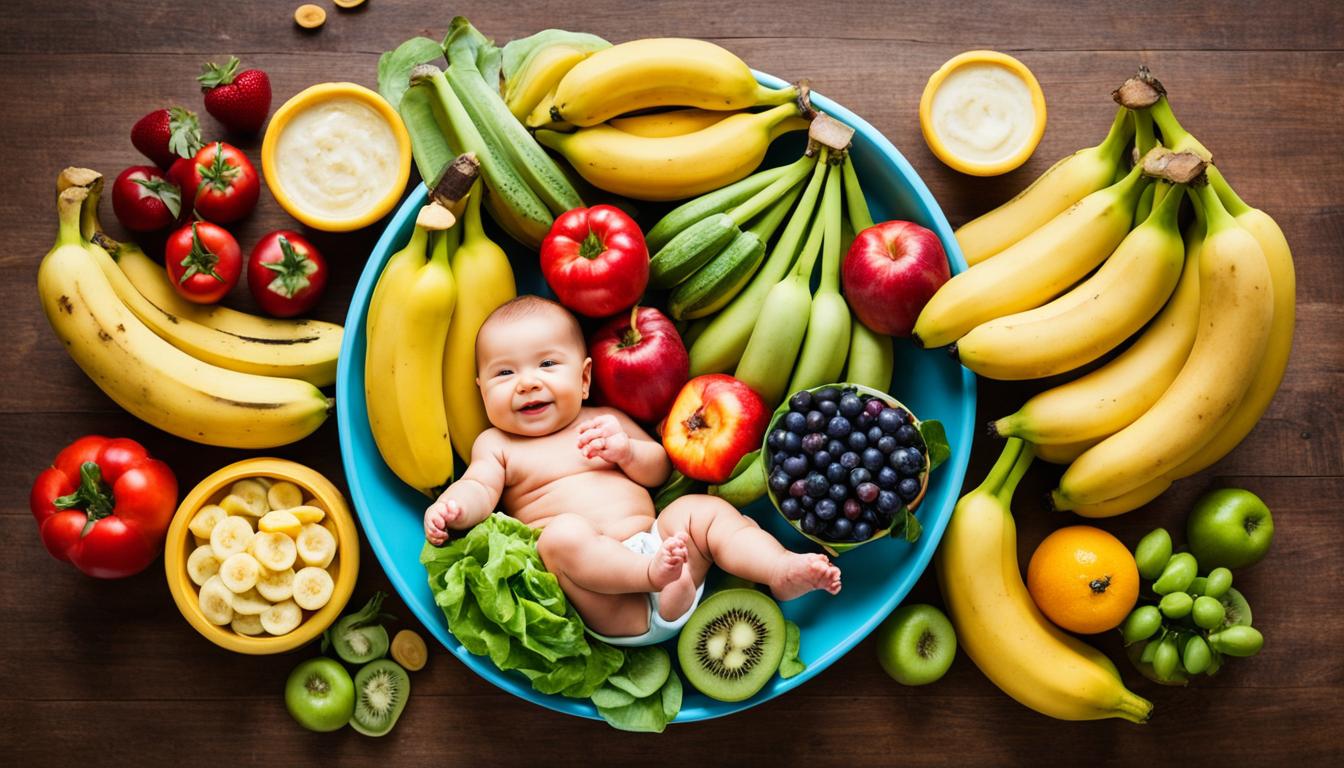Baby bananas are a nutritious addition to an infant’s diet. They offer a range of health benefits, making them an ideal fruit for infants starting solid foods. This section will explore the benefits of baby bananas for infants and discuss their nutritional value. We will also provide tips on how to introduce baby bananas to an infant’s diet, along with some delicious baby food recipes that feature them.
The Nutritional Value of Baby Bananas
Baby bananas are packed with essential nutrients that make them an excellent choice for infants starting solids. These small, sweet fruits are a nutrient-dense food that provides numerous vitamins, minerals, and dietary fibers.
One medium-sized baby banana contains about 90 calories, 23 grams of carbohydrates, and 2.6 grams of dietary fiber, making them a great source of energy for growing infants. Baby bananas are also rich in vitamin C, providing 10% of the recommended daily amount (RDA) per serving, which is essential for a healthy immune system and strong bones.
Another vital nutrient found in baby bananas is potassium. One serving of baby bananas provides up to 12% of the RDA of potassium, which helps regulate blood pressure and promotes healthy heart function. They are also a great source of vitamin B6, providing 20% of the RDA per serving, which plays a crucial role in cognitive development and the production of red blood cells.
Despite their sweetness, baby bananas have a low glycemic index, and their sugar content is balanced by their rich fiber content. This means that consuming baby bananas does not cause a spike in blood sugar levels, making them a perfect food for infants with blood sugar issues.
Overall, baby bananas are an excellent source of essential nutrients that can contribute positively to an infant’s healthy diet. We recommend consulting with a pediatrician before introducing baby bananas to determine whether they are suitable for your child’s diet.
Introducing Baby Bananas to Infants
Introducing solid foods to infants can be a tricky process. However, incorporating baby bananas into their diet is a great way to provide necessary nutrients and develop their taste. It’s important to introduce baby bananas at the right age, usually between 4-6 months when the baby can sit up with support and has good head control.
Before offering baby bananas, make sure they are ripe and easy to mash. Mash them into a puree or chop them into small pieces to reduce the risk of choking. Mix mashed baby bananas with other pureed fruits or vegetables, such as avocado or sweet potato, for added flavor and nutrients. Alternatively, offer them as finger foods in a safe environment, making sure to supervise the baby closely.
Baby bananas are a versatile ingredient that can be incorporated into various baby food recipes such as banana oatmeal, banana pancakes, and banana pudding. By experimenting with different recipes, parents can create delicious and nutritious meals that their little ones will enjoy.
Pro Tip: You can freeze mashed baby bananas in ice cube trays for later use in smoothies, purees, or oatmeal. It’s a convenient way to have homemade baby food on hand when you’re short on time.
Baby Banana Puree for Infants
One of the best ways to introduce baby bananas to infants is through purees. Baby banana puree is easy to make and can be a great addition to your baby’s diet. Here is a simple recipe that you can try at home:
<strong>Ingredients:</strong>
- 1 ripe baby banana
- 1-2 tablespoons of breast milk or formula
<strong>Instructions:</strong>
- Peel and slice the baby banana into small pieces.
- Blend or mash the banana pieces until smooth.
- Add 1-2 tablespoons of breast milk or formula to achieve the desired texture.
Baby banana puree is nutrient-dense and provides a host of essential vitamins and minerals that are important for infant growth and development. By incorporating baby banana puree into your baby’s diet, you can also help develop their palate and encourage them to try new flavors.
Moreover, baby banana puree can be used as a base for introducing other fruits and vegetables to your baby’s diet. You can try adding mashed sweet potato, avocado, or pear for added flavors and nutrients.
Homemade baby food recipes with baby bananas can be cost-effective compared to commercial brands, which may contain preservatives and added sugars. Plus, preparing baby banana puree at home ensures that your baby is getting fresh, wholesome, and organic food.

